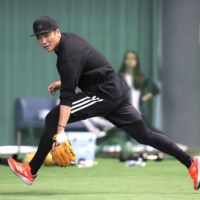Amid the fury of the sixth wave of the coronavirus pandemic, Japan’s 12 NPB teams will open their spring training camps on Tuesday in Miyazaki and Okinawa prefectures, where locals are hoping the game can bring an economic upturn.
With the spread of the highly contagious Omicron variant, the sense of unease surrounding baseball’s spring is mounting as one player after another has become infected.
In January alone, at least 70 players have tested positive, with infections having increased through groups of players taking part in the joint non-mandatory workouts that are common in the weeks leading up to spring training.
Six infections each were reported from two groups centered around Fukuoka SoftBank Hawks stars Yuki Yanagita and Nobuhiro Matsuda. Tokyo Yakult Swallows slugger Munetaka Murakami, last year’s Central League MVP, was infected for the second time just before the start of camp.
League rules give teams limited contractual authority over players’ activities in December and January, making protocols hard to enforce.
“We’re not able to control or check on them. We just don’t (in this period),” said Isao Inoue, the director of communications for the Pacific League’s Hawks, who have had at least 10 players infected this offseason.
Should the virus infiltrate a spring training camp, where large numbers work and live in close proximity for several weeks, the risk of community spread is huge. This raises concerns of baseball activities being canceled.
In response, NPB’s 12 teams have requested mandatory testing at least twice a week, and strict enforcement of joint-dining rules.
While strengthening measures to prevent infections, there are also ways to limit the consequences of infections after they occur.
Those determined by local health authorities to have been in close contact with infected individuals will quarantine as long as required by government policy.
However, individuals considered by their teams as “likely close contacts” will face a minimum six-day quarantine and be cleared to resume training after two negative tests.
Faced with the recent surge in infections, new Hokkaido Nippon Ham Fighters manager Tsuyoshi Shinjo anticipated trouble.
“It could be that half the players become infected, and we can’t keep thinking about such scenarios,” he said.
Infectious disease specialist Kazuhiro Tateda called for people to remain vigilant.
“We can’t suppress this if we let our guard down,” the Toho University professor said.
As long as local governments do not prohibit it, teams intend to allow fans to attend their camps.
According to the Bank of the Ryukyus’ Ryugin Research Institute in Naha, the southern island prefecture of Okinawa only gained a boost of ¥2.36 billion yen ($20.4 million) last year, when fans were unable to visit spring training sites. This was a severe drop from 2020, when the camps brought in ¥12.17 billion yen.
With a COVID-19 quasi-state of emergency now being applied to most of the nation, there are concerns consumer traffic will suffer. But at the same time, hopes remain that tourists will flock to spring training sites, and bring a large economic boost during Okinawa’s February low season.
In a time of both misinformation and too much information, quality journalism is more crucial than ever.
By subscribing, you can help us get the story right.
Source : Baseball – The Japan Times
